Firaxis Games and 2K Games released the expansion Rising Tide for Sid Meier’s Civilization: Beyond Earth on October 8th, 2015. The expansion aimed to add aquatic cities and revamp the diplomacy system along with a slew of changes to help with the overall game and hopefully improve immersion which was criticised heavily in our review of the original game.
Other changes include adding hybrid affinity units and bonuses to give the player more viable paths to a winning strategy. Also, more distinction is given between the biomes and heavy emphasis was given to exploration with the new Artifact system. As usual for a Civ Expansion, four new factions have been added, one of which is heavily specialised in taking advantage of the aquatic cities’ mechanic.
Overall, the expansion does improve the game considerably and many of the new features are actually interesting (you can find a summary of the new features in our preview). So, there is no denying the expansion improved the experience but there are some glaring issues that remain in the game such as the victory conditions and the AI. Also, some changes may not be to everyone’s liking. Though personally I did enjoy the new diplomacy system, there are elements in it (or elements that were removed) that some players will be disappointed with.
Though the expansion won’t change the mind of those who were completely turned off by the game, those who did get some enjoyment with the core game may find the expansion interesting. However, it’s hard to tell if this expansion is enough to convince anyone that was sitting on the fence. It all depends on what you felt was lacking in the core game.
Immersion and Quests
Effort has been placed to help with the game’s immersion. Some changes were subtle, like adding more visual effects to certain objects while others were more obvious like the new musical tracks and more pronounced art in several screens. This doesn’t address all the issues, like the quotes, even the ones by the leaders, which are read by the same narrator; nor does it address the anti-climactic presentation of wonders – which were two things I pointed out in my review that hurt the game’s immersion considerably.
This doesn’t mean the immersion wasn’t improved significantly but considering the starting point one would hope considerable improvements were made. One place where the improvements shine are the diplomatic quotes. However, this will be only in the written text, the voice acting is still limited to the small collection of quips we found in the core game. However, some tailored responses do appear and help in giving the leaders a bit of life.
The other place where this improvement shines is in the quests. There are more now, and most are chain long quests with a decent amount of text that adds more background lore. The new quests actually stand out, sometimes telling the story of a single colonist on the new world. Though the repetitive building quests that spam the player present in the original game are still there, they have at least given them different possible backstories. The choice and bonuses are still the same regardless of the story given though.
So, the problem of quantity over quality still occurs with the building quests, though some have had a balance pass to help make the choices more competitive. You’ll still get some old repeat offenders like the Sonic Fence, which is a no brainer to choose (convoy immunity trumps extended range every time). The alternating lore might give the player an incentive to read on, but considering how many you get, it won’t be surprising if many skip to the choice right away.
Diplomacy
One of the biggest changes to the game is the Diplomacy system which is actually new for a Civ game. This can be a mixed bag for some players who like a more traditional diplomacy system where the player trades resources and manipulates third parties into wars or peace. The ability to bribe someone to go to war or pay for (or extort) resources from another player is gone.
Resource Trading is now merged into the trade route system, which is influenced by the diplomacy system. This does give the player a little more flexibility over resource trading, but it takes away the ability to do it cleanly with an allied partner. This does make trade route selection a little more interesting though, instead of it just being the “highest Science or Energy” only.
What was added was a trait system along with a diplomatic capital system. This lets the player purchase personality perks which are traits that give bonuses. These traits can be changed or upgraded. The player can also sign treaties with other factions for bonuses related to their selected traits, giving some very interesting bonuses. These cost diplomatic capital, which is earned by building certain buildings, any wonders, and letting other factions form treaties from the traits you’ve selected.
The player can also enter in formal cooperative agreements that have to be manually broken to end, and permanent alliances that are also manually downgraded to end. The same is true with sanctioned (the new denounce). During wars, the player earns a War Score, and during the peace treaty the player with the higher score can make demands up to the difference in score. These can be techs, energy, diplomatic capital, and even cities. This system is better and more transparent than the one present in the core game, and allows for another method to take your enemy’s technologies.
This new diplomacy system is an improvement as the core game had the vanilla version of Civ V’s diplomacy imported with a flawed favor system added to it. This system is far better and gives the player interesting options in developing their own faction, and it also rewards cooperative diplomatic play. However, as mentioned before, people who are more into a classical diplomacy system might not be too thrilled by this mechanic because of the removal of third party manipulation.
What the new system most certainly helps with is by giving the leaders a bit of personality. The AI factions tend to gravitate towards certain traits and they start with their own faction’s specific trait. This flavours what each faction will like about the player and give more transparency as to why one faction gains respect while another loses it. The diplomacy system also tracks fear which can be used instead of respect to change the diplomatic stance. It should be noted fear is not as stable, and the AI is prone to backstabbing if fear is all that holds an alliance.
The messages of improving or deteriorating relations don’t happen in a pace breaking pop-up screen, but instead inside a short notification that happens in the background as a side notification. Despite the cringe worthy revelation that Twitter lives on in the future, it’s more welcomed than Civ V and the original Beyond Earth’s taunts. Many of these messages, and the messages you get when you open the diplomacy screen, will be tailored for each leader, and can change depending on which leader you’re playing. This helps in bringing more life to the leaders.
Biomes, Exploration, and Aliens
Two new biomes were added, Primordial and Frigid, and all biomes get a small distinctive effect. This is limited to the behaviour and statistics of the aliens. This does make each biome more unique but is not as pronounced as some might hope as it only impacts the aliens. The two new biomes are visually distinctive however.
In relation to this, new aliens have been added and their textures slightly modified to make them blend more into the selected biome. The biggest change is that alien nests can spawn on any of the three affinity resources, and aquatic nests have been added. This makes the aliens more of a prevalent presence, but are still a pushover once you hit the mid to late tech units.
Another addition is the increased presence of ruins and the possibility of finding artifacts in these ruins. This introduces the artifact system. It is a straight-forward system where you collect artifacts from Earth (crashed wreckages), Alien (nests), and Progenitor (ancient ruins). The player can consume them right away for some output or form sets of three that give unique unlocks like special wonders, buildings, or traits.
The artifact system gives more incentive to continuously explore and to uncover ruins even in the late game. Combined with the improved biomes, and increased number of sites, it makes for a more involved early game and exploration persists for a longer phase during the game. Overall, this is a marked improvement in giving the world more atmosphere.
In addition, each biome may contain one or two Great Wonders which triggers a quest that requires the player to interact with special sites. When these quests are completed they can give the player bonuses like sight from these sites to bonuses for the cities that control the area around these special sites. Overall, they are not as impressive as the name implies but it does add more incentive to explore vigorously and find these locations.
Hybrid Affinities and Aquatic Cities
The other big addition are hybrid affinity units along with hybrid perks as the player increases in rank in each affinity. This gives the player even more options and flexibility. Also, these hybrid paths have their own lore and special units. The new units have more variety than the ones found in the core game, as they have many passive or special abilities like acting as a wall to range attacks or healing nearby units.
This hybrid affinities change comes with an improved unit upgrade screen. These new units are actually interesting and honestly seem to give more interesting options than the core game’s units. The downside is that these hybrid paths do not have their own victory conditions. Instead, the player will still need to take one of the original three affinity paths, or go for the Contact victory. What the hybrid units and perks seem to help with is the Domination victory. This reinforces Beyond Earth’s more warlike tendencies in gameplay considerations.
Rising Tide also introduces aquatic cities. Overall, they are still cities when it comes to what they can do, except they can move, which is the main way for them to gain territory. The only other way to expand their borders is by buying tiles as they do not expand on their own from culture. Also, certain buildings can’t be built in them and aquatic cities have a wide selection of buildings unique to them. This also holds true for wonders.
Considering the extensive amount of resources found at sea, this gives the player considerably more options to expand, making it easier to gain the resources the player needs. Sadly, the AI doesn’t exploit this as quickly or effectively as the player can. Also, aquatic cities grow slower than normal cities, so the player is still encouraged to develop some land cities to maximise their output.
Aquatic cities offer new gameplay options and an all aquatic empire is an interesting playstyle to consider (one faction even specialises in this option), but some might still prefer the old fashioned land-based cities. They are distinct enough to be more than just “land cities on water” and do offer a new variation to gameplay. One thing is for certain, the player is not as well defended or contained by land-lock chokepoints anymore.
AI and Stability
Overall, I encountered no major bugs or crashes while playing, though there are some balance issues in artifact buildings and with a few mechanics. A novice player will not spot them but a skilled player will quickly find ways to exploit these issues to win the game faster. The only technical glitch I experienced is the slight hang-up that occurs when you reach the end of the turn processing, which seems to get worst the longer the game has gone.
The AI hasn’t been improved, or if it has been it is not evident. This is partially because of aquatic cities, because the AI doesn’t seem to know how to use them to their full potential. This, combined with the “sloppy AI with naval war” issue, as it has always been since Civ V, puts the AI at a disadvantage with the new mechanics. It won’t be hard for an average player to play at a higher difficulty setting, and a skilled player to overcome the highest difficulty levels. The game’s highest difficulty will not be a significant challenge for anyone who has played Civ V at Emperor or higher.
Final Verdict
Overall, the expansion does significantly improve the game. Though I may have been a tad too generous in my vanilla review, the expansion has earned the final score more. However, this doesn’t mean the expansion is perfect. Also, considering the flaws that were present in the core game, this means the game has a long way to go to hit that perfect sweet spot.
The game definitely took huge steps in becoming more immersive with Rising Tide. Though a lot of these additions are easy to overlook, some are not. The heavier focus on exploration and the richer more filled spaces in the fog of war makes exploration more visceral. The player can now expand on land and sea, giving them more options, which sadly the AI has trouble keeping up with. Also, there’s more freedom in Affinity choices, and new units that are more alien and distinct than before.
Diplomacy is far more involved and transparent now. However, the loss of being able to manipulate factions as a third party might be seen as a step back by some. The other criticism I can see in the new diplomacy is that it is a new form of income generation and income spending for perks that end up basically feeling like a more free-form and flexible Policy system. Not a bad system, but maybe one that would work as an addition to conventional diplomacy instead of replacing it.
I will not lie though, there were elements of the old Civ V diplomacy that were flawed, so losing them completely is more of a blessing than a curse. I liked this new system, but it might not be to everyone’s taste. However, despite the addition of the new diplomacy system, which does reward diplomatic play, the game still seems to have a more militaristic and warlike component when compared to previous Civ games (despite this being the AI’s weakest point as well).
The new affinity quests also help a lot and I found myself starting to read them again. Also, the Tech Web has been colour-coded more to make it slightly easier to navigate. Affinity-giving techs are much easier to spot now.
The one heavy criticism I have is that not much was done about the victory conditions. As I said in my initial review, the mechanic is just four different flavours of Tech Victories and one Domination Victory. All the tech victories were standard race to the finish line; the game has no tug of war victory mechanic like we’ve seen in past Civilization games.
Overall, I can recommend the Rising Tide expansion to anyone who enjoyed the original game, or to those who were on the fence leaning heavily on liking it. For those who hated the core game I doubt the expansion will change their minds even if it is a step in the right direction. As for those firmly on the other side of the fence, but still peering across, it is hard to say if the expansion will finally tip the balance. It all depends on what your issues with the original release were.
|
Space Sector score:
7.8/10
good
|
|---|
| The Good: – Water based cities give new expansion and exploitation options. – Hybrid Affinity offers new military options and affinity paths. – The new Diplomacy system rewards cooperation and improves immersion. – More Affinity based quests help bring some life to the setting. – New art assets and improved visual effects help with immersion. |
| The Bad: – Very little changes or improvements were made to the victory conditions. – The AI seems to be even weaker now with the option for water based cities. – Still has immersion issues especially with Wonders. – The new Diplomacy might not be what some players want in such a mechanic. |

7 Comments
Related Articles:
- Civilization: Beyond Earth – Rising Tide Expansion News
- Civilization: Beyond Earth – Fall Patch Released
- Civilization: Beyond Earth Update and Interview
- Civilization: Beyond Earth Update and Release Date Reveal
- Galactic Civilization III: Mercenaries – Impressions

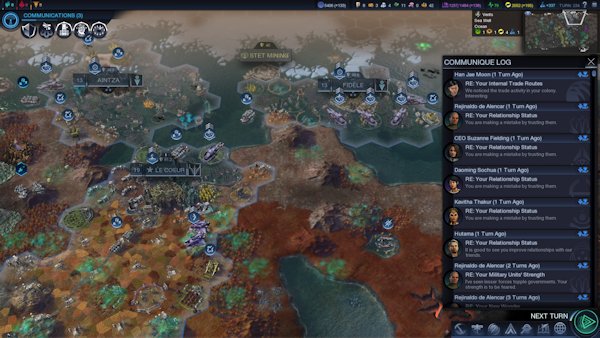
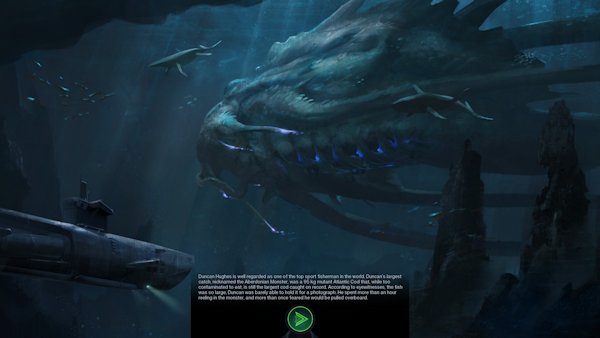
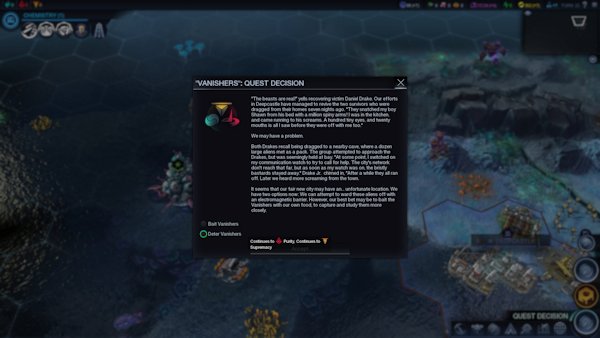
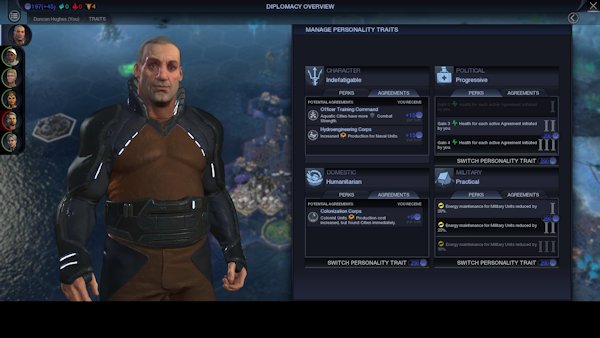
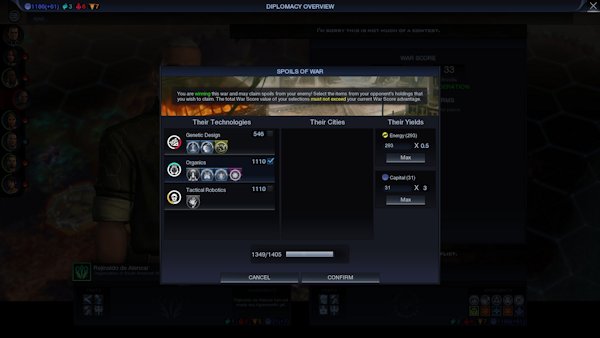


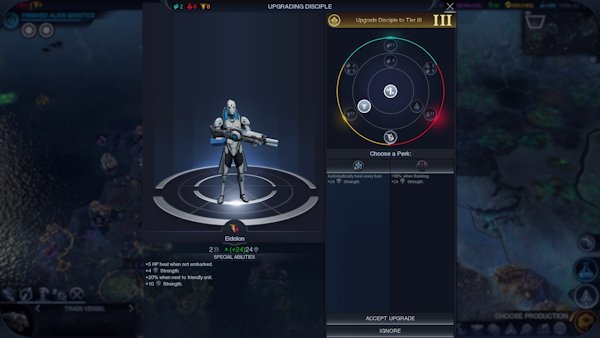
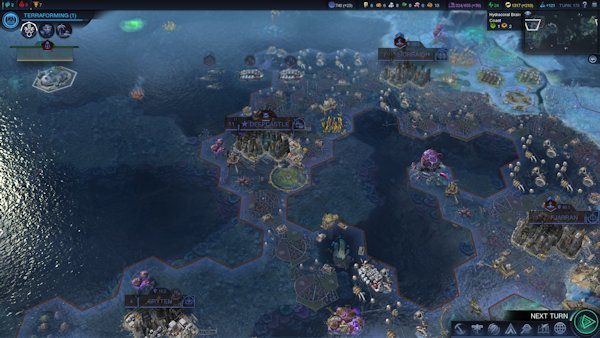
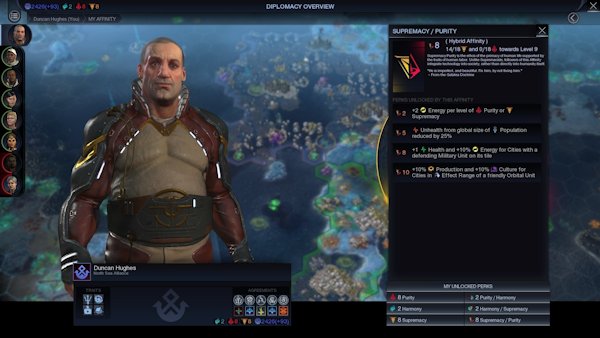
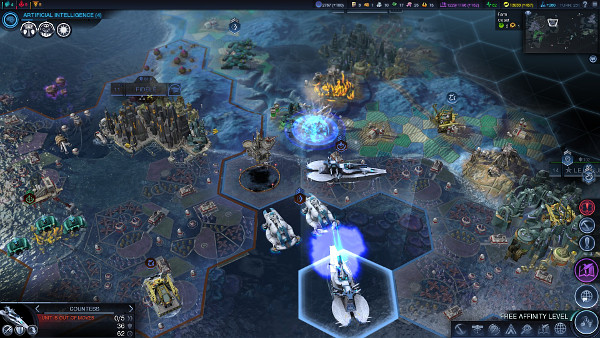

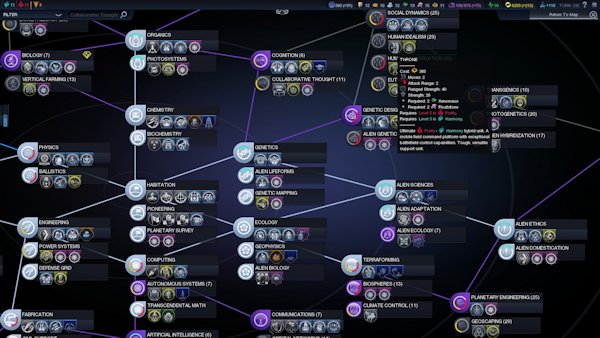







Not good enough. Need one more expansion like Civ V.
Judging by this review, it may have even regressed compared to the original game. The AI is even worse.
One serious weakness of Civ V that carried over to BE is that the AI was simply dumb. It was unable to wage war. I suspect that it will be even worse with the water.
I don’t expect any expansions to fix this one and without a good AI, this game just doesn’t have what it takes to be great.
That’s sad but this is like how Simcity 4 never got a good successor until Cities Skylines came around. This is not really a worthy successor to Alpha Centauri.
No doubt, it does add content. Sea Colonies being the most obvious. Diplomacy feels more involved but still lacking in character. The Artifact System is interesting but lacks credibility. Why you would get a combat bonus from certain of those ordinary items makes zero sense.
For me the game just plays out too slow. I can play a full game of the old Alpha Centauri in half the time CivBE takes.. And now that you can play Alpha Centauri in any resolution you want, I will still be playing that instead. . :D
That was my thought too, Alpha Centauri is vastly better in almost every way imaginable. So many of these new remakes end up significantly worse than the original, even when they’re trying to stick to the original formula.
Not sure if that means game devs from the 80s and 90s were certified geniuses or that modern devs are completely clueless.
All the flash new mechanics since CIV I might look great and sound great on paper but if the AI hasn’t progressed to use them, the whole is definitely less than the sum of its parts.
No chess game will put you against an AI that doesn’t know how to move the pawn so why are all the 4X devs nowadays so hell bent on adding mechanics for us players to interact with the game but fail to realize we also expect the game to interact with us using the same tools.
I am missing one massive critique point and that is too expansive basically they are nearly asking the same full price for an expansion that puts in things that should have been in the base version?
Firaxis is becoming too much like EA. I just hope they do not do this with X-COM2 otherwise that will be the last game I will ever buy from Firaxis.
The goodwill Firaxis banked over the last decade isn’t bottomless. Firaxis can pad their short term revenue with these DLC-heavy approach but eventually, people will start judging their games on pure merit.
I hate it when MBA types think of some ‘brilliant’ way to increase the revenue but their degree never taught them how to deduct customer sentiment from their long term balance sheet.
At least Jake is smart enough to know putting put modding support this time around will ensure hundreds of unpaid man hours from the community will support XCOM 2 for years to come.